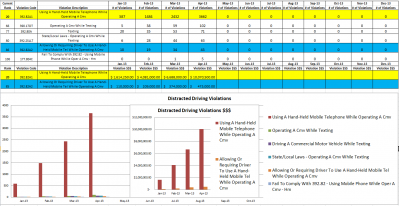The following is a guest post by: Dr Gerry Purdy, Ph.D
Alicia and I were watching “American Idol” last week - just like you and millions of other people. But, all of a sudden, something ‘strange’ happened in the background while Ryan Seacrest was talking. I didn’t notice it at first it and then I realized what happened.
I thought, “Mariah Carey is texting during a live TV show!” So, I backed up the show a bit and looked at it again. This time I paid close attention to Mariah sitting at the judges table in the background. “My god, she is sitting there doing text messaging in front of 20 million people. She clearly wasn’t supposed to be doing that.”
Well, that got me thinking. “Why do people take a risk of texting when clearly they shouldn’t be reading and composing text messages?” We all know that there’s a strong emotional need to pick up your smartphone when you’re not supposed to and either compose a new text, or – more likely – respond to a text you just received.
With the advent of many state laws outlawing texting while driving, it isn’t a matter of just altering your behavior. Rather, it’s a need to resolve the emotional drive to read and then do a quick reply. It’s not just a few people who feel this way. Rather, we all seem driven in a very similar way about this at times.
I think part of the inherent drive comes from the nature of texting being an immediate message. You know someone has created a message just for you, and you feel a sense of personal pride and affirmation about being ‘singled out’ by someone. There’s also a cultural issue that you see so many other people instantly replying when they receive a text message that it give each of us the affirmation that it’s OK to do it.
Email doesn’t elicit the same emotional reaction. You may get a beep or other audio notification that you’re received an email, but because you know it’s an email, you know that the person who sent it isn’t expecting you to reply instantly. But, with a text message, you not only think about your desire to respond quickly, but you know the person who sent you a text message is likely sitting there staring at their smartphone display waiting – yes, waiting – on you to reply in the next few seconds.
It’s like there is an underlying rule of texting: “Hey, if you get a text, it’s not some low priority, ‘answer whenever you can’ kind of thing over the next few hours. The rule is that you must pick up your smartphone, read the message and reply immediately because it has to be a matter of life and death. You have to compose a reply immediately so the person’s dire request is answered within the expected next few seconds.”
Of course, you can see where this is headed. If two people both feel this way, then the situation is ripe for a rapid exchange of 20-30 text messages until someone gets interrupted or one of the parties feels it finally has gone too far.
It may be that when we get into a car, it’s best to put the smartphone in silent mode or, even better, turn it off. But, turning it off may not be wise either. What if you receive a call from someone that is very important – even life threatening? You don’t want to miss that just because you’re trying to avoid texting. So, turning the phone off may not be the best thing to do.
There are a number of apps out there (like ZoomSafer by Aegis Mobility that won the 2013 Mobility Award) that can shut down texting when the app senses that you’re moving above a threshold speed such as 10 mph. Such software is getting much better than when it was just being introduced a few years ago. The app can now detect if you’re on a train or public transportation vehicle and determine if you’re driving or a passenger.
Back to Mariah Carey texting during a live episode of “American Idol.” First, no one in the audience is allowed to bring their phone into the studio. The security for these shows is very tight. Alicia and I were fortunate to attend an episode of “Dancing with the Stars” about 18 months ago, and we had to go through metal detectors, check in our cameras and phones and be checked again.
I presume if you’re Mariah Carey (or any high profile judge), you get exemption rights to check your phone. That’s a policy that the show’s producers might want to review. But, I can see that once they allowed her to bring it into the studio (even in silent mode), it’s easy for her to see a text message appear on the display and then have a strong emotional need to reply since the scene was all about Ryan Seacrest talking, not the judges. It may have been a steamy text from husband Nick Cannon.
You can see why she may have been so driven to reply. Personally, I don’t blame Mariah Carey for texting when clearly she shouldn’t have been. The show producers and operations managers allowed her to take her smartphone into the studio. That ‘teed up’ the situation where she really couldn’t help herself. Someone was texting her, and she felt just had to reply. The producers need to help her by asking her for her phone while she’s on stage and then putting it in a case so the staff can’t read her text messages.
The next time you find yourself in a situation where you shouldn’t be texting (like driving or being on national TV), either avoid the temptation (hard, I know) or send a really short message like ‘driving’ or ‘on TV’ and then put it somewhere you can’t easily pick it up until your situation has changed.
Oh, and yes, we are hooked on American Idol. I believe that Angi Miller is going to win. And not only win, but I think she’s going to become as popular as Carey Underwood. You heard it here so don’t be surprised if Angi Miller wins “American Idol,” has lots of hit songs and wins a lot of Grammy’s.
About the Author: Gerry Purdy, Ph.D. is Principal Analyst, Mobile & Wireless, MobileTrax LLC. As a nationally recognized industry authority, he focuses on monitoring and analyzing emerging trends, technologies and market behavior in the mobile computing and wireless data communications industry in North America. Dr. Purdy currently is a columnist for eWeek and CIT Insight and is an affiliated analyst at GigaOM.


 This is a critical issue because the official state records drive awareness, legislation, funding and solutions.
This is a critical issue because the official state records drive awareness, legislation, funding and solutions.